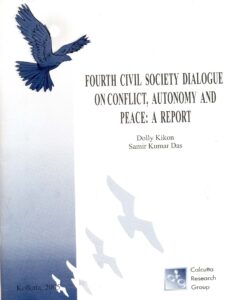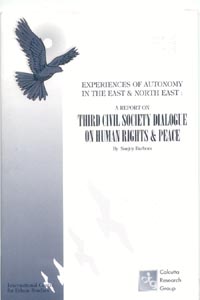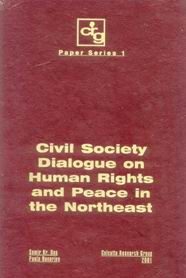REPORTS ON INDIAN AUTONOMY

The fourth dialogue (2004), held with the support of Ford Foundation in November 2004. Edited by Dolly Kikon and Samir Kumar Das.

The third dialogue (2003) was held in Shillong in collaboration with ICES, Colombo on the theme of the autonomy. The dialogue was motivated by a realisation that autonomy was in itself an exercise in reconciling the limitless expanse of people’s aspirations with the pragmatic concerns of governance, as framed in national constitutions – by no means an easy task. One of the conclusions of the deliberations was that what appeared as guarantees of autonomy compatible with the aspirations of given groups of people within the framework of the constitution, or even within international law, were actually a condensed body of intricate political negotiations. In essence, these negotiations are processes that lead to further democratisation of society and politics.
The dialogue discussed in details provisions such as the Sixth Schedule, Article 371-A and the Panchayati-Raj institutions. / Edited by Sanjoy Barbora.

The second dialogue (2002) was on the theme of Women, Human Rights and Peace in the Northeast. In the Northeast of India women are constantly negotiating fixed identities. It is true that they have organised themselves on the basis of role identities such as the Naga Mothers’ Association or the Mizo Widows’ Association. But membership for the Nagas is open to all adult women. They have privileged the term “mothers” largely because there are very few entry points for women in state versus community conflicts in which their ethnicity is given primacy over their gender. Again, there are groups such as the Meira Paibies who do not overtly invoke their social roles. But the term “torchbearers” also have gender connotations, as it is associated with women putting up a vigil for protection of their communities. These and many other instances of negotiating identities and roles towards peace and justice were the issues in the second dialogue.
The dialogue was held in partnership with the Konrad Adenauer Stiftung and the Foundation for Universal Responsibility. Edited by Paula Banerjee.

The publication is part of a comprehensive report on the first civil society dialogue (2001) on peace in the northeast. The dialogue was on the Naga peace process. It took note of the fact as to how people’s rising expectations triggered off by the cease-fire agreement were about to relapse into helpless pessimism and widespread violence. The purpose of the dialogue was not so much to regret the inability of the civil society to translate such strong popular sentiments into impeccable ‘historical facts’ of peace, but very much to take lessons from history and accordingly refashion our cognitive tools in order to establish peace and make it sustainable.
The first dialogue was held in collaboration with Konrad Adaneur Stiftung and WISCOMP. Edited by Samir Kumar Das and Paula Banerjee
[Unavailable in Print Form ]
